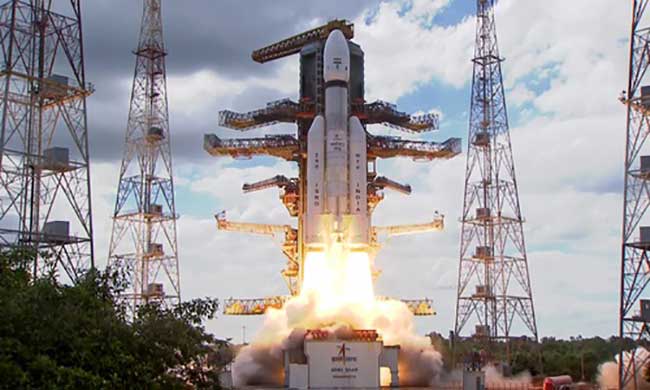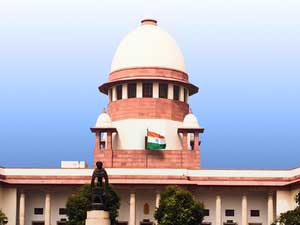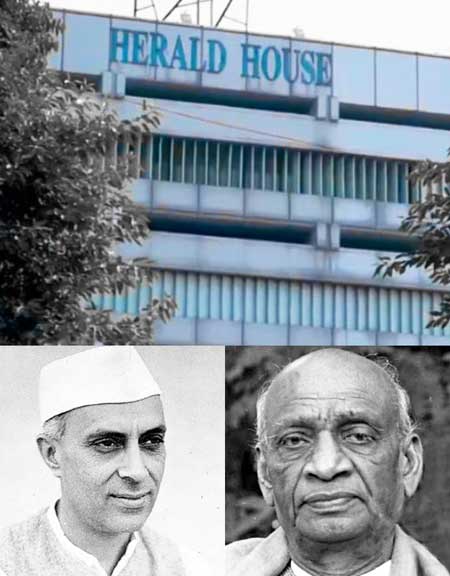India may be sending spacecraft to orbit the Moon and Mars, and plans to send one to study the Sun and Venus, and finally, humans to space in the last four decades of this century, but its presence in the global space sector market is a mere two-three per cent.
The advantage, though, is that the principal player, the Indian Space Research Organisation (ISRO), has established itself as an end-to-end operator.
India has to go a long way to catch up with other major spacefaring nations in terms of rocket and satellite capabilities.
That process has begun with the opening up of the sector in 2020 to allow private players to make/own/launch/operate satellites and rockets.
A recent EY report has put the global market size of the space sector at $447 billion in 2020 and is estimated to touch $600 billion by 2025.
According to the EY report, the Indian market size in 2020 amounted to $9.6 billion, which was 0.5 per cent of gross domestic product (GDP) in the country.
As per the EY report, out of the 5,465 satellites operational by the end of April 22, the US has the highest share of 63 per cent, followed by China-10 per cent, Russia- three per cent and others accounting for 24 per cent.
Last year, the Indian government said the country has about 53 operational satellites that includes communication/navigation/earth observation and science satellites.
Between 2022 and 2023, the number of Indian satellites up in the sky has not increased drastically.
In terms of rocket's carrying capacity, India's heavy lift rocket LVM3 can carry a maximum of four tonne whereas the rockets of the US, China and Europe can carry several times higher.
As a matter of fact, India uses the services of Arianespace's Ariane rockets to orbit heavier communication satellites.
"From a regional perspective, the US, China and the European Space Agency (ESA) collectively accounted for approximately 81 per cent of government space spending in 2020. It is not surprising that the US leads in the share of total active operating satellites at 63 per cent," EY said.
The Indian government allocated about Rs.12,543.91 crore for the country's space sector.
The Indian government, citing a 2020 study done by a global consulting firm, told the Parliament that the revenue generated by the global space industry may increase to over $1 trillion by 2040.
In order to increase India's share in the global space market, the government opened up the space sector in 2020, which an industry official had termed as "the surgical strike".
Things are changing with the private sector players marking their presence.
For instance, satellite maker and operator Pixxel has got a five year contract from the NRO Commercial Systems Program Office (CSPO), USA under the Strategic Commercial Enhancements Broad Agency Announcement for Commercial Hyperspectral Capabilities.
Pixxel will provide technical hyperspectral imagery (HSI) remote sensing capabilities via modeling and simulation and data evaluation.
The company has announced raising of $36 million in a Series B funding round with participation from new investors such as Google, along with existing investors Radical Ventures, Lightspeed, Blume Ventures, growX, Sparta and Athera.
The fresh funds will bolster the plans to launch six satellites in 2024 and 18 other satellites by 2025, Pixxel said.
"Lower costs have opened the door to new start-ups and MSMEs, and have also encouraged established aerospace companies to explore novel opportunities that once seemed too expensive or difficult. The technological improvements and advents of new tech have also intrigued investors, resulting in a surge of space funding over the past few years. We look forward to more private participation here," Chaitanya Dora Surapureddy, CFO, Dhruva Space, told IANS.
The Hyderabad based Dhruva Space is involved in building satellites, earth stations and also the satellite dispenser systems fitted in the rockets.
Dhruva Space's first mission was launched on 30 June, 2022, successfully testing Satellite Deployment Systems, followed by the launch of two satellites named Thybolt-1 and Thybolt-2 on 26 November, 2022.
Owing to the Russian-Ukraine war, the UK satellite communication company OneWeb used ISRO's rocket LVM3 to orbit 72 of its satellites.
The UK company had earlier tied up with Russia for putting its satellites into orbit.
OneWeb will be seriously looking at ISRO's rockets for orbiting its fleet of second generation satellites.
More foreign space companies are showing interest in Indian start-ups for making and launching satellites.
"We are seeing a groundswell of partnerships with Indian Space companies. For example, Dhruva Space and Kineis, a French satellite service provider, have confirmed our intention to pursue technological and commercial cooperation in space, in line with the MoU signed in March 2023 with the launch of a satellite that we will operate jointly," Sanjay Nekkanti, CEO, Dhruva Space told IANS.
According to Nekkanti, the Make-in-India initiative may drive the growth of manufacturing satellites owing to the increased demand for small satellites.
"By 2025, the satellite manufacturing segment will be the second fastest growing in the Indian space economy. Having proven our full-stack technologies' capabilities through our Thybolt Mission in November 2022, we are very excited to be a key player here," Nekkanti added.
On the rocket side, Promethee, a French new-space operator, has decided to look at Skyroot Aerospace's Vikram rocket to orbit its JAPETUS earth observation constellation.
Last year, Skyroot Aerospace tested its rocket with a sub-orbital mission.
Another rocket startup Agnikul Cosmos is also planning a sub-orbital flight for its rocket.
On its part, the Indian space agency ISRO has decided to transfer the technology to manufacture small rockets -Small Satellite Launch Vehicle (SSLV)- to private industries.
According to the IN-SPACe -Indian regulator for the private space sector players- globally, with the emergence of the commercial space sector, it is expected that more than 20,000 satellites will be launched in the coming decade, as pointed out by Euroconsult.
For India to have a significant share of the commercial launch services market, it is necessary that the aggregate lift off capacity of the nation be increased multifold, quickly.
To this end, there is a need to complement the launch capacity of ISRO by allowing Indian private players also to own and operate launch vehicles developed by ISRO.
Earlier, ISRO had selected Hindustan Aeronautics Ltd-Larsen and Toubro consortium to make five Polar Satellite Launch Vehicle (PSLV).
The Indian space agency is now in the process of developing rockets that can carry more than four ton luggage.
On the policy front, the government has come out with a new Space Policy and the new policy for foreign direct investment (FDI) is on the anvil.
Having built the end-to-end capability in the space sector and with the entry of the private sector, the Indian space industry has one way to go, that is upwards. Already the signs are visible.






New Act enacted to curb Waqf misuse, claims Tripura CM
Tripura Chief Minister Manik Saha on Thursday said that the Waqf (Amendment) Act 2025 has been passed in the Parliament, aiming to address allegations of misuse of Waqf properties by a section of leaders, misuse of Section 40, land grabbing, and other corruption.
DoNER Ministry facilitate in unlocking Manipur’s growth: Scindia
Union Development of North Eastern Region (DoNER) Minister Jyotiraditya Scindia on Thursday said that he is confident that his ministry would serve as a proactive facilitator in unlocking new opportunities and accelerating Manipur’s growth and development.
Bengal school jobs row: SC allows 'untainted' teachers to continue till fresh selection is over
The Supreme Court on Thursday allowed the "untainted" assistant teachers in West Bengal, whose appointments were cancelled due to large-scale irregularities in the 2016 selection process, to continue in their positions till fresh recruitment is completed.
Waqf Act row: No fresh appointments or de-notification of existing waqfs, Centre assures SC
The Supreme Court on Thursday recorded the undertaking given by the Union government that no fresh members would be appointed to waqf boards and the Central Waqf Council in terms of the Waqf (Amendment) Act, 2025, till the next date of hearing, and asked it to file its preliminary reply within seven days.
Patel's alarm, Nehru's ‘dismissal’: The origins of the National Herald storm
A series of letters exchanged between Sardar Vallabhbhai Patel and Jawaharlal Nehru in May 1950, as documented in the book Sardar Patel’s Correspondence, suggest that Patel expressed concerns to Nehru regarding the use of the ‘National Herald’ for fundraising purposes.
Kailash Manasarovar Yatra likely to resume soon: MEA
India and China continue to make progress on finalising the modalities to resume Kailash Manasarovar Yatra which can start soon, the Ministry of External Affairs (MEA) announced on Thursday.
Pakistan's reputation as epicentre of global terrorism will not diminish: MEA
Slamming Islamabad's attempts to distance itself from Tahawwur Hussain Rana, the mastermind of the deadly 26/11 Mumbai terror attacks, India on Thursday said that no matter how hard Pakistan tries, its reputation as the epicentre of global terrorism will not diminish.
India emerging as key player in global defence production: Rajnath Singh
Highlighting the growing production capabilities, Defence Minister Rajnath Singh said on Thursday that India today stands shoulder to shoulder with developed nations in critical areas such as missile technology (Agni, BrahMos), submarines (INS Arihant), aircraft carriers (INS Vikrant), AI, drones and cyber defence.